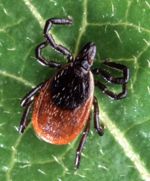Difference between revisions of "Arachnid Flashcards"
Jump to navigation
Jump to search
m |
m |
||
| Line 27: | Line 27: | ||
*'''''Nymph undergoes ecdyses forming the adult''''' | *'''''Nymph undergoes ecdyses forming the adult''''' | ||
||[[Arachnida#Life Cycle|<span title="Answer article">Link to Answer Article</span>]] | ||[[Arachnida#Life Cycle|<span title="Answer article">Link to Answer Article</span>]] | ||
| + | |} | ||
| + | |||
| + | ==<font color="purple">Ticks</font>== | ||
| + | {| border="3" cellpadding="8" | ||
| + | !width="400"|'''Question''' | ||
| + | !width="400"|'''Answer''' | ||
| + | !width="150"|'''Article''' | ||
|- | |- | ||
|<big>'''What are seed ticks?''' | |<big>'''What are seed ticks?''' | ||
| Line 32: | Line 39: | ||
*'''''Tick larvae''''' | *'''''Tick larvae''''' | ||
||[[Arachnida#Life Cycle|<span title="Answer article">Link to Answer Article</span>]] | ||[[Arachnida#Life Cycle|<span title="Answer article">Link to Answer Article</span>]] | ||
| + | |- | ||
| + | |<big>'''How can you differentiate hard ticks from soft ticks?''' | ||
| + | ||<font color="white"> <big> | ||
| + | *'''''Soft ticks have no scutum''''' | ||
| + | *'''''The mouthparts are not visible from the dorsal surface of soft ticks''''' | ||
| + | *'''''Hard ticks have festoons''''' | ||
| + | *'''''Hard ticks can be ornate''''' | ||
| + | ||[[Suborder: Metastigmata, ticks#Morphology|<span title="Answer article">Link to Answer Article</span>]] | ||
| + | |- | ||
| + | |<big>'''True or False: Soft ticks can swell up to three times their body size whilst taking a blood meal''' | ||
| + | ||<font color="white"> <big> | ||
| + | *'''''False''''' | ||
| + | *'''''Soft ticks feed little and often and cannot expand to three times their body size whilst feeding''''' | ||
| + | *'''''Female hard ticks can swell up to three times their body size whilst engorging on a blood meal''''' | ||
| + | ||[[Suborder: Metastigmata, ticks#Morphology|<span title="Answer article">Link to Answer Article</span>]] | ||
| + | |- | ||
| + | |<big>'''List the mouthparts of ticks''' | ||
| + | ||<font color="white"> <big> | ||
| + | *'''''Hypostome''''' | ||
| + | *'''''Chelicerae''''' | ||
| + | *'''''Palps''''' | ||
| + | ||[[Suborder: Metastigmata, ticks#Mouthparts|<span title="Answer article">Link to Answer Article</span>]] | ||
| + | |- | ||
| + | |<big>'''Fill in the missing words about soft and hard ticks''' | ||
| + | ||<big>Soft ticks feed <font color="white">'''''little and often'''''</font> and on <font color="white">'''''many hosts'''''</font>. Hard ticks take <font color="white">'''''one'''''</font> blood meal at each <font color="white">'''''life cycle stage'''''</font> and can feed on <font color="white">'''''one, two or three different hosts'''''</font> during their life cycle. | ||
| + | ||[[Suborder: Metastigmata, ticks#Life Cycle|<span title="Answer article">Link to Answer Article</span>]] | ||
|} | |} | ||
| − | |||
| − | |||
| − | |||
==<font color="purple">Mites</font>== | ==<font color="purple">Mites</font>== | ||
Revision as of 12:12, 7 January 2009
|
|
Arachnids
| Question | Answer | Article |
|---|---|---|
| What are the two divisions of the arachnid body? |
|
Link to Answer Article |
| Summarise the arachnid life cycle |
|
Link to Answer Article |
Ticks
| Question | Answer | Article |
|---|---|---|
| What are seed ticks? |
|
Link to Answer Article |
| How can you differentiate hard ticks from soft ticks? |
|
Link to Answer Article |
| True or False: Soft ticks can swell up to three times their body size whilst taking a blood meal |
|
Link to Answer Article |
| List the mouthparts of ticks |
|
Link to Answer Article |
| Fill in the missing words about soft and hard ticks | Soft ticks feed little and often and on many hosts. Hard ticks take one blood meal at each life cycle stage and can feed on one, two or three different hosts during their life cycle. | Link to Answer Article |
